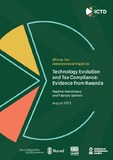| dc.contributor.author | Hakizimana, Naphtal | |
| dc.contributor.author | Santoro, Fabrizio | |
| dc.coverage.spatial | Rwanda | en |
| dc.date.accessioned | 2023-08-16T09:56:28Z | |
| dc.date.available | 2023-08-16T09:56:28Z | |
| dc.date.issued | 2023-08 | |
| dc.identifier.citation | Hakizimana, N. and Santoro, F. (2023) 'Technology Evolution and Tax Compliance: Evidence from Rwanda', ICTD, African Tax Administration Paper 30, Brighton: Institute of Development Studies, DOI: 10.19088/ICTD.2023.033 | en |
| dc.identifier.uri | https://opendocs.ids.ac.uk/opendocs/handle/20.500.12413/18080 | |
| dc.description.abstract | Information technology (IT) has great potential to help increase taxpayer compliance and
revenue collection. Despite the increasing use of IT solutions by African tax administrations,
evidence on its effectiveness remains limited. In Rwanda, the Revenue Authority introduced
a more advanced version of its electronic billing machines (EBM) to enhance its ability to
track business transactions remotely and to improve taxpayers’ experience of using the
machines. Using a wealth of administrative data collected by the Revenue Authority, this
paper evaluates the impact of the adoption of EBM2 on the ways in which firms file their tax
returns. In particular, we are able to compare first-time users of EBM2, who are mostly new
taxpayers, with ‘shifters’, who moved from the old EBM1 to EBM2. We looked first at value
added tax (VAT). Overall, the adoption of EBM2 resulted in significant increases in reported
business turnover, non-taxable sales, taxable sales, VAT inputs and VAT due. There was
also a reduction in the proportion of completed VAT returns that implied zero VAT liabilities.
Unsurprisingly, there was no significant overall change in the VAT returns from ‘shifters’.
They had probably internalised the benefits of electronic billing machines when using the
earlier EBM1 version. The effects of the adoption of EBM2 on income tax returns are less
positive. Overall, no increase in income tax liability is reported. These results suggest that
taxpayers do not believe that the Revenue Authority will attempt to reconcile their (separate)
VAT and income tax returns. Taxpayers probably provide more reliable VAT returns because
they believe, on the basis of the installation of electronic billing machines, with upgrades, that
the Revenue Authority is focusing more on VAT. The main policy implication is that the
Revenue Authority should make more effort to reconcile firms’ separate VAT and income tax
returns, so that the positive effects of the new electronic billing machines on VAT compliance
will spillover into income tax compliance. | en |
| dc.language.iso | en | en |
| dc.publisher | Institute of Development Studies | en |
| dc.relation.ispartofseries | African Tax Administration Paper;30 | |
| dc.rights.uri | http://creativecommons.org/licenses/by/4.0/ | en |
| dc.subject | Finance | en |
| dc.subject | Technology | en |
| dc.title | Technology Evolution and Tax Compliance: Evidence from Rwanda | en |
| dc.type | Other | en |
| dc.rights.holder | © Institute of Development Studies 2023 | en |
| dc.identifier.doi | 10.19088/ICTD.2023.033 | |
| rioxxterms.funder | Default funder | en |
| rioxxterms.identifier.project | Default project | en |
| rioxxterms.version | VoR | en |
| rioxxterms.versionofrecord | 10.19088/ICTD.2023.033 | en |
| rioxxterms.funder.project | 43db2a26-ab53-4dd1-873f-cff26a51d1e0 | en |


